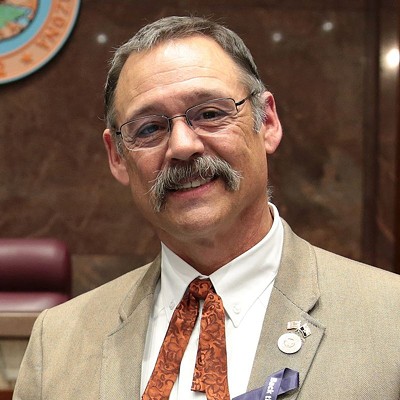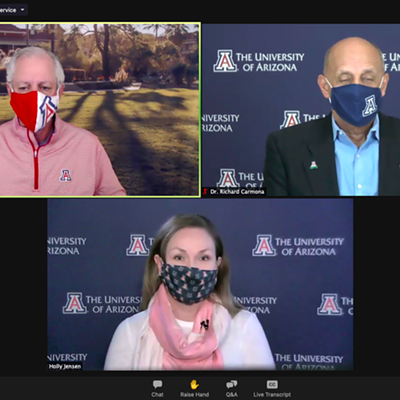SIGNATURE EFFORTS
As we note in "Courtroom of the Absurd" in this issue, there's already a legal battle on between the Democratic candidates for mayor, although attorney Jonathan Rothschild seems to be much more likely to prevail in court than Marshall Home.
Democrats are now taking aim at Republican mayoral candidate Shaun McClusky and independent candidate Pat Darcy. Pima County Democratic Party Chairman Jeff Rogers expected that challenges to both of the candidates' signatures would be filed before the deadline on Wednesday, June 15.
McClusky needed 1,060 signatures and turned in 1,183, leaving him with a cushion of just 123 signatures. Darcy did a little better; as an independent candidate, he had to turn in 2,596 and delivered 3,105, giving him a margin of 509.
But Rogers says that a review of Darcy's petitions has revealed more than 650 signatures that Democrats will challenge in court.
The Dems have not taken aim at Republican mayoral candidate Ron Asta, who also had a thin cushion; he turned in 145 signatures above the minimum.
It could just be that Democrats don't think he has much of a chance in November, but there's another school of thought: If Asta is not on the ballot, a GOP write-in candidate for mayor would have to get just 1,060 votes in the primary to get on the November ballot. If Asta is on the ballot, a write-in candidate would have to get more votes than Asta, so Asta would serve as a block against a better write-in candidate.
On the other hand, that's a lot of write-in votes—and it's not as if Republicans were lining up to run for mayor earlier this year.
Even though the Democrats are ignoring him, Asta may face a challenge anyway. Jessica Reeves Foster told The Skinny earlier this week that she plans on consulting with an attorney and challenging Asta's candidacy before the deadline.
Foster is the sister of Jennifer Reeves, an 18-year-old woman who was killed in 1994 after Asta ran a stop sign and crashed into the pickup that Reeves was driving.
The story of the traffic accident threatened to torpedo Asta's campaign earlier this year. After press accounts of the accident, Asta ran a TV ad asking whether he should stay in the race. About 100 people said he should quit, while about 70 said he should stay in, according to Asta, who decided to remain in the race.
Foster remembers her sister as a generous teenager who would dig through the family's freezer to find extra frozen meats to hand out to the needy.
"She'd take them to people who didn't have any food," Foster says.
Foster says she's not as angry about Asta's candidacy as she was when he first announced his plan to run, but the TV ad upset her nonetheless.
"The most appalling thing was his commercial and pointing the finger at Jennifer and saying she was speeding, instead of just saying that he was involved in an accident and he was sorry," Foster says.
FOLLOWING THE MONEY
The due date for the next round of campaign-finance reports in the Tucson City Council race isn't until the end of June, but there's a carrot that encourages candidates to turn in their reports sooner: the city's campaign-financing program.
In the late-'80s, long before the state established Clean Elections, Tucson voters passed an initiative creating a program that provides a dollar-for-dollar match for mayoral and council candidates. Once council candidates qualify by gathering at least 200 contributions of at least $10 from Tucson residents, they're eligible for a dollar-for-dollar match for whatever money they raise.
The catch: They have to agree to limit their spending. Although the final figure has yet to be determined, council candidates are limited to spending roughly $104,000 this year; mayoral candidates are limited to roughly $208,500.
Qualifying for matching funds is a sign that a campaign is organized; the sooner that threshold is passed, the sooner matching funds come rolling in, and candidates can concentrate on something besides fundraising.
While all of the council candidates are participating in the program this year, only one council candidate has already qualified for matching funds: Ward 2 City Councilman Paul Cunningham, who had raised $17,641 through May 28. Cunningham still had nearly $12k in the bank, according to his campaign-finance report. Cunningham is facing Republican Jennifer Rawson.
This week, Ward 1 Councilwoman Regina Romero applied for matching funds. Through the end of May, Romero reports raising more than $43,526. Provided that auditors don't find problems, she'll have more than $86,000 once she gets her match.
Since Romero is limited to spending $78,177 in her primary against fellow Democrat Joe Flores, and would only face a write-in candidate in the general election, she's essentially done fundraising for the election season.
Some of Romero's notable contributors: attorneys Bob Gugino ($430) and Keri Silvyn ($100), who have represented the Rio Nuevo board which has been sparring with the city over downtown redevelopment; David Goldstein of Diamond Ventures ($410); downtown developer Fletcher McCusker ($420); Don Bourn, who gave Romero $200 (which is twice the $100 he paid for the still-undeveloped downtown Thrifty block he purchased from the city before Romero was on the council); and Jim Horvath of Town West Realty, which has dabbled in downtown redevelopment ($240).
While all of the council candidates are participating in the matching-funds program, few of the mayoral candidates are. Only independent Pat Darcy and Green Party candidate Mary DeCamp have signed up to accept matching funds; the other Green Party candidate, Dave Croteau, has declared that he won't spend more than $500 on his campaign. Democrat Jonathan Rothschild and Republicans Shaun McClusky and Ron Asta have not signed contracts to participate in the program.
Rothschild hasn't yet turned in a report covering his fundraising this year, but Democratic Party chairman Jeff Rogers says that the political rookie has amassed somewhere around $200,000 for his campaign, even without matching funds.
We'll see how much of that he actually needs once the legal challenges are done, and the candidate lineup settles.
GOP TO UNEMPLOYED: DROP DEAD
Gov. Jan Brewer called state lawmakers into a special session last Friday, June 10, to extend unemployment benefits for out-of-work Arizonans.
On Monday, June 13, the Legislature called it quits without accomplishing anything.
The fix in a state law—which would have involved changing one word—would have allowed Arizonans who have been out of work for 99 weeks to continue to collect unemployment benefits for another 20 weeks.
The extra dough for down-on-their-luck Arizonans wouldn't have cost the state a dime; the federal government would have picked up the tab, allowing more money to come into the state.
But conservative Republicans argued that the princely sum of just more than $200 a week was discouraging people from looking for work, so they refused to consider the extension unless they could tack on more tax cuts.
Keep in mind that the same lawmakers who want more tax cuts are arguing in court that the state doesn't have enough money to fund a health-care program for Arizonans below the poverty line, even though that program was approved by voters.
Democratic Rep. Matt Heinz of Tucson says the extension of benefits would have added $3.5 million a week to the Arizona economy.
He calls the failure to help the jobless "an enormous mistake. ... We need to take advantage of any opportunity to bring our federal tax dollars back to Arizona."















